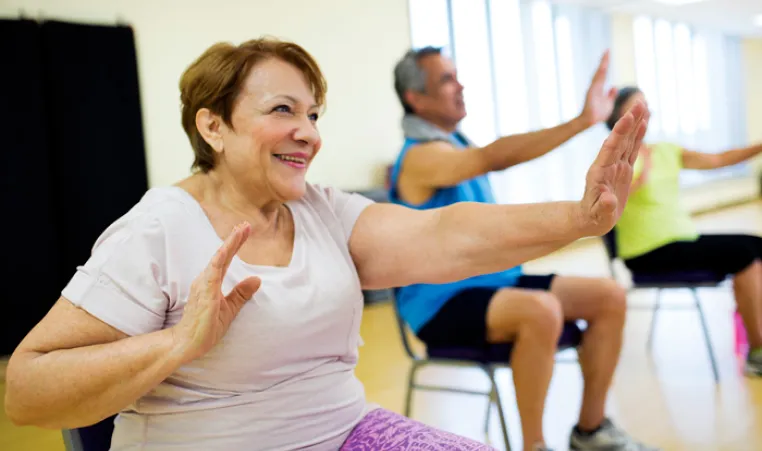
Seniors participate in the YMCA’s Moving for Better Balance class.
Falls among older adults are a significant public health concern, often leading to severe injuries and a decline in the quality of life. The YMCA is proud to combat these public health concerns and provide evidence-based programming to support seniors during Falls Prevention Awareness Week and beyond.
Falls Prevention Awareness Week is September 18-22. During this week, we encourage seniors to join one of our Enhanced Fitness or Moving for Better Balance classes. These evidence-based programs work to improve balance, muscle strength, flexibility and more.
Below, the National Council on Aging shares 10 myths related to older adult falls. After exploring these myths, the YMCA of the Suncoast wants to remind you that we are here to help!
- Myth 1: Falling happens to other people, not to me.
- Reality: Many people think, "It won't happen to me." But the truth is that 1 in 4 older adults fall annually in the U.S.
- Myth 2: Falling is something normal that happens as you get older.
- Reality: Falling is not a normal part of aging. Strength and balance exercises, managing your medications, having your vision checked and making your living environment safer are steps to prevent a fall.
- Myth 3: If I limit my activity, I won't fall.
- Reality: Some people believe the best way to prevent falls is to stay home and limit activity. That is not true. Performing physical activities will help you stay independent, as your strength and range of motion benefit from remaining active. Social activities are also good for your overall health.
- Myth 4: If I stay at home, I can avoid falling.
- Reality: Over half of all falls take place at home. Inspect your home for fall risks. Fix simple but serious hazards such as clutter, throw rugs and poor lighting. Make simple home modifications, such as adding grab bars in the bathroom, a second handrail on stairs and non-slip paint on outdoor steps.
- Myth 5: Muscle strength and flexibility can't be regained.
- Reality: While we do lose muscle as we age, exercise can partially restore strength and flexibility. It's always possible to start an exercise program.
- Myth 6: Taking medication doesn't increase my risk of falling.
- Reality: Taking any medication may increase your risk of falling. Medications affect people in many ways, sometimes making you dizzy or sleepy. Be careful when starting a new medication. Talk to your healthcare provider about your medications' potential side effects or interactions.
- Myth 7: I don't need to get my vision checked every year.
- Reality: Vision is another key risk factor for falls. Aging is associated with some forms of vision loss that increase the risk of falling and injury. People with vision problems are more than twice as likely to fall as those without visual impairment. Have your eyes checked at least once a year and update your eyeglasses.
- Myth 8: Using a walker or cane will make me more dependent.
- Reality: Walking aids are essential in helping many older adults maintain or improve their mobility. However, make sure you use these devices safely. Have a physical therapist fit the walker or cane to you and instruct you in its safe use.
- Myth 9: I don't need to talk to family members or my health care provider if I'm concerned about my risk of falling.
- Reality: Fall prevention is a team effort. Bring it up with your doctor, family and anyone else who can help.
- Myth 10: I don't need to talk to my parents, spouse, or other older adults if I'm concerned about their risk of falling. It will hurt their feelings, and it's none of my business.
- Reality: Let them know about your concerns and offer support to help them maintain the highest degree of independence possible.
In sum, seniors face several myths and risk factors as they age. Despite this, the YMCA is here to support seniors and help them age with grace and confidence.
You can learn more about the YMCA Enhanced Fitness and Moving for Better Balance fall prevention classes today!
Published: Monday, Aug. 28, 2023